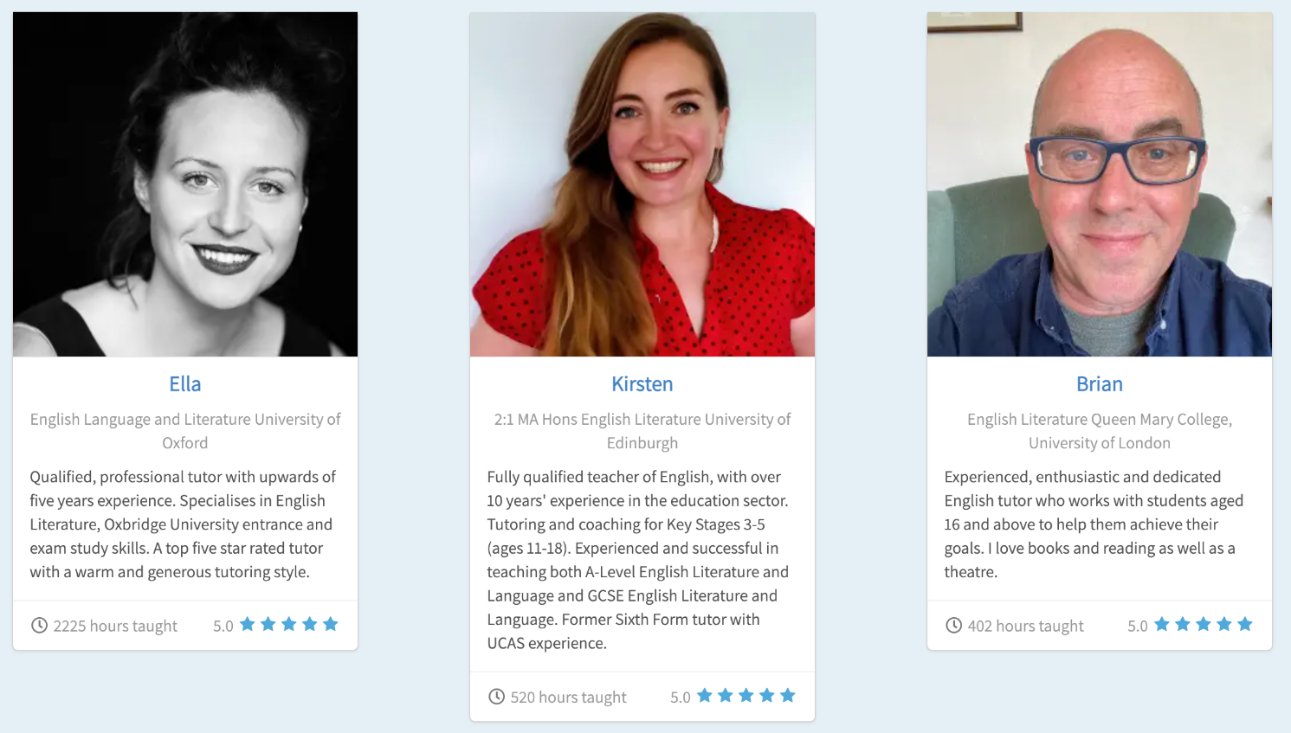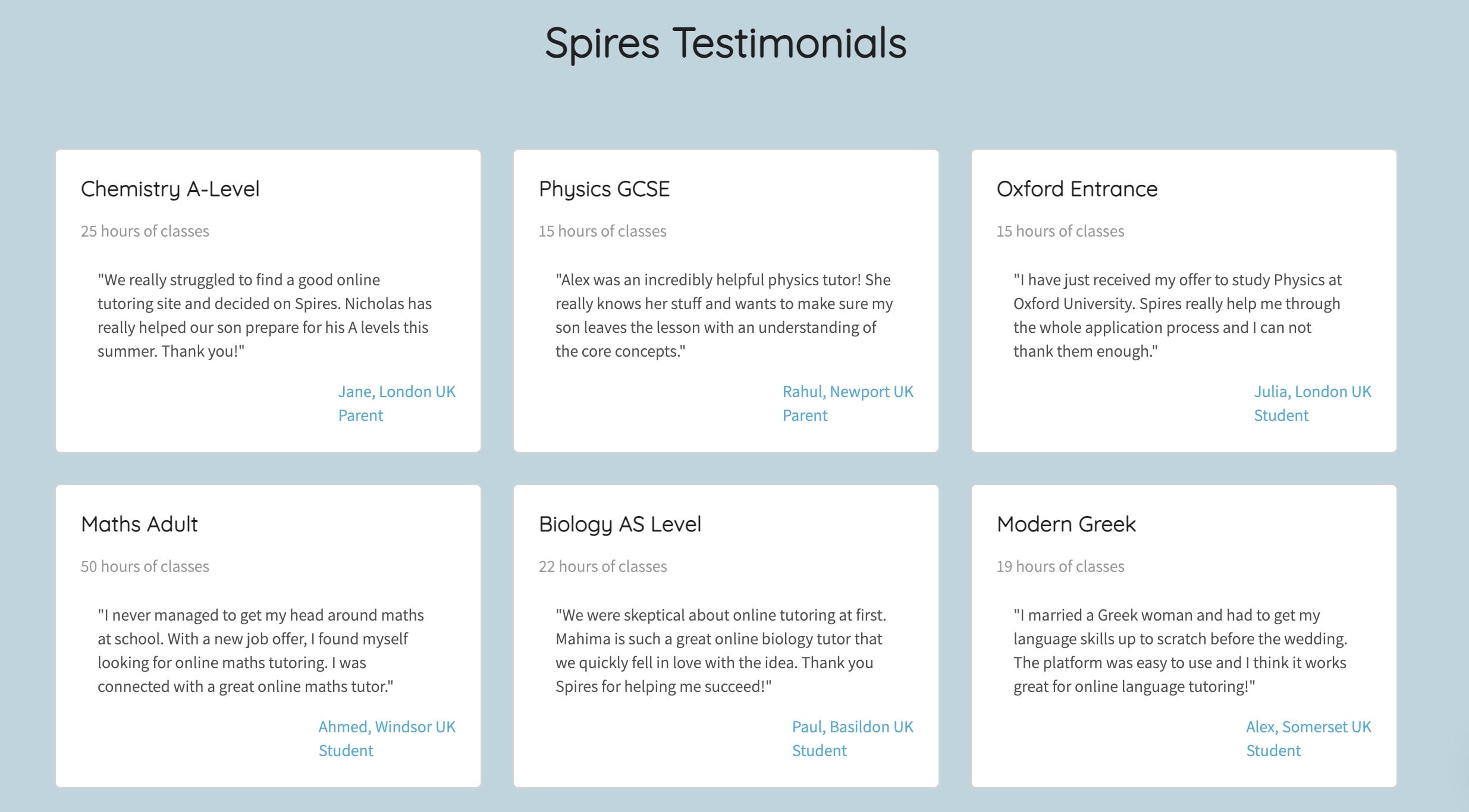If you are looking for Online IB Economics Tutors, you will be happy to learn we presently have more than 900 tutors with academic and professional experience in a wide variety of subjects from Primary to Key Stage levels, GCSEs and A-levels to professional qualifications and every single thing in between.
They work with students in the UK, EU, USA, Australia, Canada, South Africa, Nigeria, India, New Zealand and all over else!
We also have various tutors and a large array of subjects taught, French, Spanish German, English, Maths, Science, Physics, Chemistry, Biology, Science, Geography, History, English, School admissions examinations, A-level, GCSE, Key Stage, English Literature, Law, Psychology, Engineering, Economics, Finance, MBA, GMAT, GRE, ACCA, AAT, IELTS, TEFL, ESL, and you can check out even more on our platform.
Our passionate tutors also offer university tutoring and university admissions test preparation - featuring all Oxford and Cambridge entrance examinations. You might need to find a: economics, tutors, students, online, tutor, help, more, tutoring, about, that, contact, business, student, level, one, best, home, how, chemistry, english, blog, this, time, physics, economics tutors, learning, experience, subjects, biology, teaching, exam, international, them, studies, study, find, world, also, subject, school, tuition, science, through, maths, university, terms, years, experienced, understand, well, what, education, top, based, over, understanding, work, make, policy, economics tutor, not, which, very, exams, they, academic, questions, knowledge, free, support, french, first, most, resources, now, privacy, other, private, here, management, like, levels, lessons, skills, these, needs, concepts, new, each, history, igcse, team, use, provide, spanish, learn, take, know, course, every, results, economic, email, some, only, class, choose, language, would, services, schools, into, high, geography, achieve, success, topics, social, year, expert, different, psychology, teacher, see, math, real, offer, when, great, lesson, london, much, both, highly, become, hours, looking, many, information, macroeconomics, after, professional, courses, good, computer, there, grades, grade, higher, microeconomics, classes, why, content, way, view, assessment, mathematics, theory, essay, global, meet, service, specific, available, helping, number, qualified, guidance, where, potential, approach, want, full, sat, right, really, studying, improve, individual, college, writing, call, baccalaureate, personal, two, such, reserved, sessions, extended, rights reserved, reviews, syllabus, rights, key, should, politics, gcse, book, read, score, test, data, part, revision, tips, works, diploma, taught, guide, making, research, please, further, conditions, teachers, perfect, degree, preparation, may, focus, curriculum, helped, program, then, working, tailored, just, across, internal, own, goals, effective, easy, before, important, sure, copyright, style, always, made, life, literature, confidence, excellent, teach, back, during, being, primary, between, computer science, cambridge, name, areas, few, recommend, menu, question, let, company, final, online tutoring, reach, next, able, past, topic, since, papers, within, getting, range, having, quality, using, sign, universities, graduate, his, better, today, business studies, start, singapore, business management, engaging, match, privacy policy, core, providing, requirements, analysis, finance, philosophy, excel, economics tutoring, whether, follow, provides, login, international baccalaureate, development, india, accounting, process, ask, order, makes, applications, currently, government, while, often, answer, session, schedule, parents, set, myp, statistics, phone, apply, classroom, german, form, general, standard, helpful, helps, plan, thinking, child, passionate, educational, because, various, current, online tuition, difficult, send, hour, tests, develop, does, share, material, facebook, face, technology, profile, tok, popular, law, following, group, interactive, search, hong, ensure, per, required, connect, build, examples, request, related, canada, practice, feel, testimonials, below, paper, don, essays, check, entrance, its, possible, response, experts, message, must, whatsapp, kong, personalized, complete, details, including, level economics, touch, love, limited, boost, could, hard, started, career, around, taking, national, maths tutors, give, discuss, individuals, supply, person, prepare, even, techniques, same, notes, demand, succeed, ability, act, critical, future, economics tuition, higher level, economy, everything, unique, points, extended essay, master, sitemap, complex, sociology, address, online economics, programme, click, however, help students, too, access, media, expertise, market, look, dubai, answers, long, application, instagram, advanced, locations, last, price, problem, marks, ready, common, page, cover, materials, beyond, covered, languages, happy, choice, thank, australia, down, articles, hong kong, means, design, faqs, read more, had, believe, lot, undergraduate, united, opportunity, needed, advice, pace, problems, review, policies, leading, flexible, step, were, place, assessments, dedicated, three, pre, prepared, reading, physics tutors, methods, examiner, video, clear, found, feedback, create, write, given, receive, careers, performance, progress, secondary, head, fun, english tutors, cost, recent, effectively, throughout, independent, simple, skip, focused, platform, news, second, admissions, explain, keep, helping students, extra, help them, received, under, challenging, extensive, sciences, biology tutors, recommended, ibdp, options, used, worked, human, principles, qualifications, site, chemistry tutor, those, it's, structure, societies, linkedin, example, clearly, successful, website, personalised, health, positive, communication, concept, fit, difference, issues, track, proven, highest, comprehensive, trial, fully, necessary, select, easily, abilities, finding, benefits, regular, solving, location, written, relevant, delhi, confident, specialist, got, open, online tutors, amazing, anyone, via, environment, links, engineering, interview, public, close, without, never, countries, several, theories, academy, mind, background, solid, consultation, chemistry tutors, passion, live, arts, talk, prep, committed, medicine, come, people, strong, identify, usa, internal assessment, phd, yourself, twitter, foundation, assignments, growth, training, case, perfect tutor, kind, community, worldwide, 're, make sure, role, might, fill, attention, allows, examiners, addition, completed, challenges, record, info, journey, hand, according, music, learn more, achieving, tutors online, preparing, previous, definitely, going, think, less, gurgaon, special, mandarin, try, chinese, simply, rather, asked, explained, excellence, additionally, patient, explanations, online tutor, physics tutor, depth, environmental, italian, additional, trade, above, fees, pay, centre, guarantee, ace, say, assist, provided, lse, exactly, things, international economics, include, struggling, gain, oxford, already, change, rate, biology tutor, matter, offers, truly, investment, others, oxbridge, youtube, edexcel, south, require, switzerland, humanities, easier, week, city, fast, explore, society, continue, igcse economics, type, ess, commentaries, mumbai, deliver, enough, yes, benefit, together, friendly, way that, french tutors, detailed, arabic, ever, not only, explaining, strategies, submit, toronto, tutors english, uae, times, towards, introduction, masters, gmail, financial, doing, pricing, examination, days, spain, main, near, protected, maths tutor, tailor, minutes, enjoy, extremely, thorough, wide, science tutors, crucial, verified, spanish tutors, average, day, worth, expert tutors, arrange, super, etc, knowledgeable, calculus, another, quick, choosing, log, frequently, tutored, offering, list, requires, essential, variety, melbourne, studied, kingdom, chat, son, pune, english language, aqa, money, end, ensure that, coaching, suitable, economics course, models, york.



